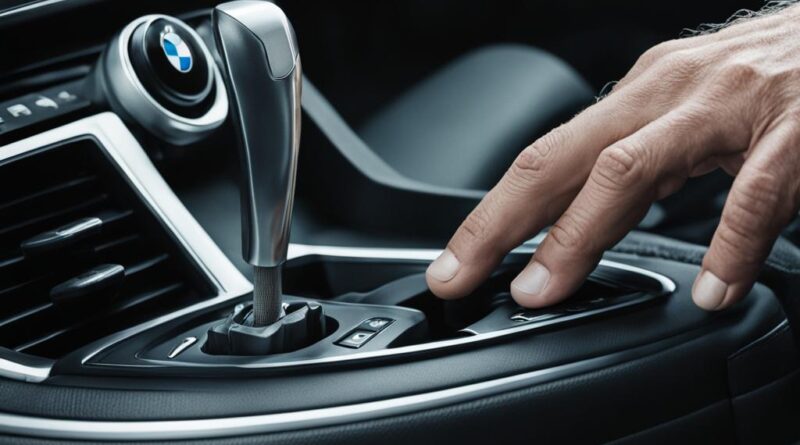BMW Transmission Malfunction – Quick Solutions
BMW transmission issues are fairly common and can manifest in various ways, such as erratic shifting, slipping, or being stuck in gear. One common symptom is the appearance of a “Transmission Error” message, which can cause the vehicle to go into SafeMode. However, not all transmission problems are catastrophic and can often be resolved with troubleshooting.
Some common causes of BMW transmission malfunction include incorrect shift points, low transmission fluid or dirty filters, weak battery, issues with the transmission mechatronic sleeve or cracked adapter, and problems with the mechatronic valve body.
Key Takeaways:
- BMW transmission issues are common and can result in symptoms such as erratic shifting and the appearance of a “Transmission Error” message.
- Transmission problems can often be resolved through troubleshooting and addressing common issues such as low fluid levels or dirty filters.
- Some common causes of BMW transmission malfunction include incorrect shift points, weak battery, and problems with the mechatronic sleeve or valve body.
- Regular maintenance, such as fluid changes and inspections, is essential for preventing transmission problems.
- If troubleshooting and basic maintenance do not resolve the issue, it is advisable to seek professional help from a certified BMW mechanic.
Troubleshooting BMW Transmission Issues
When faced with BMW transmission problems, it’s important to have the necessary knowledge and tools to diagnose and troubleshoot. By following some essential tips and techniques, you can potentially save time and money on repairs. In this section, we will explore effective troubleshooting methods for BMW transmission issues.
Resetting Adaptive Settings
One simple troubleshooting step is to reset the adaptive settings of your BMW transmission. This process involves clearing the transmission’s memory of previous driving habits and allowing it to recalibrate to your current driving style. To reset the adaptive settings, follow these steps:
- Ensure the vehicle is in park and the engine is off.
- Disconnect the negative terminal of the battery and wait for about 15 minutes.
- Reconnect the negative terminal of the battery and start the engine.
- Allow the engine to idle for a few minutes to allow the transmission to relearn your driving style.
Checking Transmission Fluid Level
Another common cause of BMW transmission problems is low transmission fluid. Insufficient fluid can lead to poor performance and potential damage to the transmission. To check the transmission fluid level, follow these steps:
- Locate the transmission dipstick, typically labeled with a yellow or red handle.
- With the engine running and transmission warmed up, insert the dipstick into the transmission fluid reservoir.
- Remove the dipstick and check the fluid level against the “Full” or “Max” marking. The fluid should be within the appropriate range.
Inspecting Transmission Mechatronic Sleeve
The transmission mechatronic sleeve is a common source of leaks in BMW transmissions. To inspect the mechatronic sleeve, follow these steps:
- Lift the vehicle using a jack or ramps to gain access to the transmission.
- Locate the mechatronic sleeve, which is typically situated on the side of the transmission.
- Visually inspect the sleeve for any signs of leakage, such as oil stains or wetness.
If you discover a leak, it is recommended to replace the mechatronic sleeve to prevent further transmission problems.
| Common Transmission Problems | Possible Solutions |
|---|---|
| Erratic shifting | Reset adaptive settings, check fluid level, inspect mechatronic sleeve |
| Slipping or stuck in gear | Reset adaptive settings, check fluid level, inspect mechatronic sleeve |
| Transmission error message | Reset adaptive settings, check fluid level, inspect mechatronic sleeve |
Reading and Resetting Fault Codes
Fault codes stored in the BMW transmission system can provide valuable insights into the specific issues affecting your vehicle. To read and reset the fault codes, it is recommended to use a BMW-specific OBD2 scanner. This scanner will allow you to retrieve the fault codes and reset them if necessary, providing a clearer picture of the transmission problems you are experiencing.
By following these troubleshooting tips, you can have a better understanding of your BMW transmission issues and potentially resolve them on your own. However, it is important to remember that more complex problems may require the expertise of a certified BMW mechanic.
Common Causes of BMW Transmission Malfunction
BMW transmission malfunction can occur due to various common causes. It is important to understand these causes in order to effectively fix BMW transmission issues and prevent further damage. Some of the most frequent culprits of BMW transmission malfunction include:
- Low transmission fluid levels: Inadequate fluid levels can lead to poor lubrication and overheating of the transmission, resulting in malfunction.
- Defective mechatronic units or valve bodies: Issues with these components can disrupt the transmission’s ability to shift gears smoothly.
- Weak batteries: Insufficient battery power can affect the performance of the transmission, leading to malfunctions.
- Faulty alternator regulators: Malfunctioning alternator regulators can cause voltage fluctuations, which can have a negative impact on the transmission.
- Malfunctioning mass air flow (MAF) sensors: Problems with MAF sensors can result in inaccurate readings, leading to improper transmission function.
When any of these issues occur, several symptoms may indicate a BMW transmission malfunction, such as slipping, harsh or delayed shifting, grinding or whining noises, fluid leaks, warning lights or error codes, and even a burning smell. It is crucial to address these signs promptly to avoid further damage and costly repairs.
To ensure the smooth operation of your BMW transmission, it is recommended to perform regular maintenance tasks. These can include transmission fluid flushes at recommended intervals, software updates, and prompt repairs when necessary. By taking proactive measures, you can prevent many common causes of BMW transmission malfunction and maintain optimal transmission performance.
Comparison of Common Causes of BMW Transmission Malfunction
| Cause | Symptoms |
|---|---|
| Low transmission fluid levels | Slipping, delayed shifting, fluid leaks |
| Defective mechatronic units or valve bodies | Erratic shifting, harsh shifting |
| Weak batteries | SafeMode activation, failure to shift gears |
| Faulty alternator regulators | Voltage fluctuations, transmission errors |
| Malfunctioning mass air flow (MAF) sensors | Inaccurate readings, improper shifting |
BMW Transmission Maintenance Tips
Proper maintenance of your BMW’s transmission is essential for preventing transmission problems. By following these tips, you can ensure that your BMW transmission operates smoothly and efficiently.
- Regular Transmission Fluid Changes: It is recommended to change your transmission fluid every 60,000 miles. This helps to remove any contaminants and maintain optimal performance. Make sure to use the recommended transmission fluid for your specific BMW model.
- Check Fluid Level Regularly: Checking the transmission fluid level is crucial for detecting any potential issues. Ensure that the fluid level is within the recommended range and not overfilled, as it can cause problems.
- Inspect and Replace Worn Parts: Over time, certain components of the transmission, such as the mechatronic sleeve or adapter, may wear out. Regularly inspect these parts and replace them if necessary to prevent leaks and maintain proper fluid pressure.
- Maintain a Good Battery: A weak battery can put extra strain on the transmission system. Ensure that your battery is in good condition and perform regular battery checks to avoid any electrical issues that may impact the transmission.
- Update Transmission Software: Keeping your transmission software up to date is crucial for optimal performance. Regularly check for any available software updates and ensure that they are installed by a certified BMW mechanic.
By following these maintenance tips, you can enhance the performance and reliability of your BMW transmission, ultimately extending its lifespan and reducing the risk of transmission problems.

Seeking Professional Help for BMW Transmission Problems
While some BMW transmission issues can be resolved through troubleshooting and basic maintenance, more complex problems may require the expertise of a certified BMW mechanic. These professionals possess the knowledge, experience, and diagnostic tools necessary to accurately diagnose and repair transmission problems in BMW vehicles.
When facing transmission issues with your BMW, seeking professional help offers several advantages. Certified BMW mechanics have undergone extensive training specific to BMW vehicles, including their intricate transmission systems. This specialized knowledge allows them to identify the root cause of the problem and recommend appropriate repairs.
One significant benefit of consulting a certified BMW mechanic is the honest assessment they provide. These professionals will thoroughly inspect your vehicle’s transmission, accurately diagnose the issue, and provide a transparent explanation of the necessary repairs. With their expertise, you can trust that the recommended repairs will address the specific problem, ensuring your BMW’s transmission operates optimally.
In addition to accurate assessments, certified BMW mechanics also offer fair quotes for transmission repairs. They understand the value and importance of your vehicle and strive to provide cost-effective solutions without compromising on quality. By relying on their expertise, you can make informed decisions regarding your BMW’s transmission repair.
When experiencing BMW transmission problems, it is advisable to schedule an appointment with a reputable repair shop specializing in BMW vehicles. By entrusting your vehicle to a certified BMW mechanic, you can rest assured that your BMW’s transmission is in capable hands, and the necessary repairs will be carried out with precision and professionalism.
Remember, professional help from a certified BMW mechanic is essential for resolving complex transmission issues and ensuring the long-term performance of your BMW.
Consulting a certified BMW mechanic can provide accurate assessment, fair quotes, and expert repair for your BMW’s transmission problems.
Conclusion
BMW transmission malfunction can be a common concern for BMW owners, but there are effective troubleshooting methods and maintenance practices that can help resolve these issues. By following the proper steps, such as resetting the adaptive settings and checking the transmission fluid level, many transmission problems can be successfully addressed.
Regular transmission maintenance is crucial in preventing transmission issues. This includes regular fluid changes and thorough inspections of key components. By maintaining proper fluid levels and addressing any worn or damaged parts, you can significantly reduce the risk of transmission malfunction.
However, if you encounter a BMW transmission problem that you are unable to resolve on your own, it is recommended to consult a certified BMW mechanic. These professionals have the expertise and diagnostic tools needed to accurately diagnose and repair transmission issues. Seeking their help will ensure a proper resolution to the problem, allowing you to enjoy a smooth and reliable driving experience in your BMW.
FAQ
What are some common warning signs of BMW transmission malfunction?
Common warning signs of BMW transmission malfunction include erratic shifting, slipping, being stuck in gear, and the appearance of a “Transmission Error” message.
How can I troubleshoot BMW transmission problems?
Troubleshooting BMW transmission problems can involve resetting the adaptive settings, checking the transmission fluid level, and reading and resetting fault codes using a BMW-specific OBD2 scanner.
What are the common causes of BMW transmission malfunction?
Common causes of BMW transmission malfunction include low transmission fluid levels, defective mechatronic units or valve bodies, weak batteries, faulty alternator regulators, and malfunctioning mass air flow (MAF) sensors.
What maintenance tips can help prevent BMW transmission issues?
Regular maintenance tips to prevent BMW transmission issues include regular transmission fluid changes, using the recommended transmission fluid, checking the fluid level, inspecting and replacing worn parts, keeping the battery in good condition, and updating the transmission software.
When should I seek professional help for BMW transmission problems?
If you are unable to resolve the transmission problem on your own, it is advisable to seek the assistance of a certified BMW mechanic who can accurately diagnose and repair the issue.
How can I effectively resolve BMW transmission issues?
Resolving BMW transmission issues involves following troubleshooting steps, maintaining the transmission with regular fluid changes and inspections, and seeking professional help when needed.




